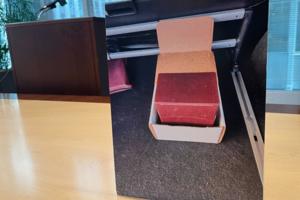Current News
/ArcaMax

Trump won't rule out pardon for Ghislaine Maxwell amid Epstein investigation
President Donald Trump Friday refused to rule out pardoning Ghislaine Maxwell as the sex-trafficking accomplice of Jeffrey Epstein met for a second day with a top Justice Department official behind closed doors.
As he left the White House for a trip to Scotland, Trump dodged a reporter’s question about whether he was considering cutting short...Read more

Minnesota rejects DOJ's request for state's voter rolls
MINNEAPOLIS — The Minnesota Secretary of State’s office has told the U.S. Department of Justice that it will not share the state’s voter registration list, as the federal government had requested last month.
The DOJ asked Minnesota election officials for voter rolls and other information to show proof it was complying with federal ...Read more

A funeral home gave parents an unmarked box with their son's brain in it, lawsuit says
PHILADELPHIA — About two weeks after their adult son, Timothy Garlington, died in November 2023, Lawrence and Abbey Butler retrieved his possessions from a North Philadelphia funeral home.
Among his belongings was an unmarked white box encasing a smaller, hard-to-open red box.
The couple drove home and left the box in their car. After a few ...Read more

9-year-old dies after incident at Hersheypark's waterpark in Pa.
PHILADELPHIA — A 9-year-old child died on Thursday evening after an incident at Hershey Park’s waterpark, according to the amusement park’s CEO.
“Tonight, a nine‑year‑old guest was tragically lost at The Boardwalk at Hersheypark. From the moment our lifeguard team recognized that a child was in distress, they performed an immediate ...Read more

DHS begins to fly detainees out of Alligator Alcatraz as DeSantis touts convenience of nearby airstrip
TALLAHASSEE, Fla., — Gov. Ron DeSantis said Friday that the federal government has begun sending flights in and out of the airstrip that is attached to the immigration detention center in the Florida Everglades, known as Alligator Alcatraz.
The governor said the federal government has deported about 100 people who were held at the detention ...Read more

We combed through newly released FBI files on Martin Luther King Jr. Here's what we know
ATLANTA — The FBI had long been watching the Rev. Martin Luther King Jr.
They bugged his hotel rooms, tracked his movements and scrutinized his relationships — all in the name of what some in the bureau considered national security.
To them, King was more than the leader of the Civil Rights Movement. He was, in the words of one top ...Read more

Sen. Fetterman says Trump administration will release $1 billion in Pa. infrastructure projects
PHILADELPHIA — President Donald Trump’s administration will soon release more than $1 billion in federal grant money for infrastructure projects across Pennsylvania, according to Democratic Sen. John Fetterman, who has been pushing for the funding to be released.
The department confirmed Friday that some of the funding has been committed, ...Read more

5 questions about Jeffrey Epstein with Miami Herald reporter Julie K. Brown
MIAMI — Julie K. Brown’s 2018 "Perversion of Justice" investigation revealed how the U.S. Justice Department gave the now-deceased sex trafficker the deal of a lifetime and cut his victims out of the process.
That reporting led the Southern District of New York to bring new sex crime charges against Epstein in 2019, but he died in federal ...Read more
After detainee release, US warns Americans: Don't travel to Venezuela
The U.S. State Department has urged Americans not to travel to Venezuela following the release of detained citizens, warning that travelers face the risk of being wrongfully held for extended periods.
The warning was posted Tuesday on the State Department’s social media accounts, four days after President Donald Trump’s administration ...Read more
How a US citizen and former Navy serviceman went missing in Haiti
First, a cop went missing. Then, a cache of rifles issued by the Haitian national police vanished. Then, the gregarious hotel manager charged with safeguarding the weapons was ambushed while driving on a Port-au-Prince street.
His bullet-riddled gray car was later found at a nearby police station.
The mysterious disappearances are now the ...Read more

Florida says it's evaluating storm evacuation options at Alligator Alcatraz
MIAMI — With the peak of hurricane season only days away, Gov. Ron DeSantis defended his administration’s lack of a public hurricane evacuation plan for Alligator Alcatraz, the immigrant detention facility in the heart of the Everglades.
In a press conference at the site on Friday, the governor pushed back at criticism that the state was ...Read more

Miami-Dade mayor demands 'immediate access' and oversight over Alligator Alcatraz
MIAMI — The Mayor of Miami-Dade County is once again demanding access to Alligator Alcatraz, the immigrant detention center in the Everglades that was rapidly built on property seized from the county.
Mayor Daniella Levine Cava’s letter to the state, issued Friday, was a stern call for “immediate access and oversight authority” and ...Read more

Florida-based Blue Angels sued over free speech rights related to cat's death
The U.S. Navy Blue Angels, based in Pensacola, Florida, are being sued for violating constitutional free speech rights after their performances allegedly terrorized a woman’s pet to death.
On Monday, Lauren Ann Lombardi, of Seattle, filed a lawsuit against the governmental agency, according to WEAR-TV, the ABC affiliate in Pensacola.
...Read more
Seattle faith leaders gather for vigil in solidarity with immigrants
SEATTLE — A group of nearly 100 people came together for a multifaith vigil outside the U.S. Courthouse in Seattle on Thursday to declare solidarity with immigrant communities. Some wore kippas, clericals, necklaces bearing crosses or the Star of David.
“Together in Welcome,” was co-hosted by several organizations, including the Jewish ...Read more

U of New Mexico shooting: 1 killed, 1 wounded; suspect at large
An early-morning shooting at the University of New Mexico in Albuquerque left one person dead and another wounded, prompting a shelter-in-place order, officials said Friday.
The suspect remains at large and “may still be on campus” as of 8 a.m. local time, the school said in a statement shared on social media.
The UNM Police Department ...Read more
Mayor Todd Gloria order seeks to strengthen San Diego's polices on immigration enforcement
SAN DIEGO — Reacting to the Trump administration’s aggressive immigration enforcement playing out across San Diego, Mayor Todd Gloria this week issued an executive order calling for measures to support the community that include know-your-rights outreach, interagency planning for response to “disruptive” enforcement actions and requests ...Read more

Conservative group, state senator sue Colorado Gov. Jared Polis over state's move to keep tax on overtime
DENVER — A conservative advocacy group and a state senator sued Gov. Jared Polis and the head of Colorado’s tax agency Thursday, alleging that recent legislation requiring the continued taxing of overtime pay — in the face of federal changes — violates the state constitution.
The lawsuit, filed in Denver District Court, argues that ...Read more

Zelenskyy plans to ask Europe for help to pay Ukraine's soldiers
Ukrainian President Volodymyr Zelenskyy plans to ask European allies to help finance improved salaries for troops resisting Russia’s invasion, in a bid to ease growing shortages of recruits.
“Previously, Europeans refused to provide funding for the salaries of our military personnel, only for weapons,” Zelenskyy told reporters in Kyiv on ...Read more

Thailand warns of war with Cambodia as US, China urge calm
Thailand warned its conflict with neighboring Cambodia could “potentially develop into a war” as troops used rockets and artillery to shell targets along their contested border for a second day.
Acting Prime Minister Phumtham Wechayachai told reporters Friday that the severity of the clashes was escalating, endangering civilians, and ...Read more

UK Cabinet pushes Starmer over backing of Palestinian state
LONDON — U.K. Prime Minister Keir Starmer is facing pressure from senior members of his government and French President Emmanuel Macron to imminently recognize Palestine as a sovereign state due to the worsening humanitarian crisis in Gaza.
Some Cabinet ministers have grown frustrated with Starmer’s resistance to fulfilling his promise to ...Read more
Popular Stories
- Trump says not 'necessary' to fire Powell after getting Fed tour
- 'Hell on earth': A Venezuelan deportee describes abuse in El Salvador prison
- Trump's homelessness crackdown direction draws pushback and some nods in California's Orange County
- Las Vegas police officer who fatally shot Brandon Durham will not be indicted, lawyer says
- Ghislaine Maxwell 'answered all questions' from Trump DOJ official, attorney says





